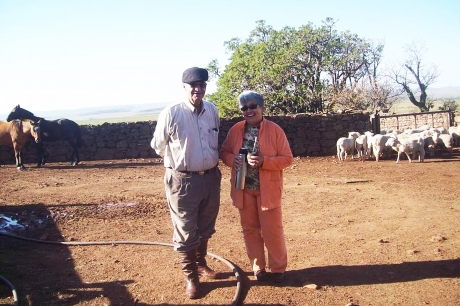
Fifty years ago, Maria Teresa De Los Santos and her husband Abayubá Rivas inherited the 495-hectare cow and sheep farm situated in the Salto department in northern Uruguay. This San Ceferino farm had been in Abayubá’s family since he was born. When his father passed away and it became Abayubá’s responsibility, Maria Teresa left her job as a schoolteacher to work on the farm.
Over the decades, with the knowledge that they had, Maria Teresa and Abayubá spent enormous amounts of time and energy working on the natural grasslands and making their livestock as productive as possible to feed their family of six, including two sons, one daughter and one grandson who lived with them. Their considerable efforts were enough to provide food and basic needs for their family but very little else. With the house in disrepair and the farm needing infrastructure upgrades, Maria Teresa and Abayubá looked for opportunities to improve their livelihood.
At this time, a team from FAO’s Livestock and Climate (Ganadería y Clima) project came to this area to present to producer organizations, and Maria Teresa’s was one of them. Both she and Abayubá got very interested in the prospect of improving their farming income and becoming more resilient to climate change while reducing the physical labour the farm required. After the team’s presentation, they submitted their application and were accepted to the programme.

Their family is one of the 62 selected to partner in this FAO project led by the Uruguayan Ministry of Livestock, Agriculture and Fisheries and the Ministry of Environment, with financial support from the Global Environment Facility (GEF). Under the technical direction of FAO, the fieldwork is executed by the Agricultural Research Institute and the Faculty of Agronomy of Uruguay. The project works with farmers to implement climate-smart livestock practices that improve production, increase incomes and at the same time reduce greenhouse gas emissions and restore natural ecosystems.
At the onset of the project, Luisina Torres, an extension officer, worked with the family to analyse their current situation and identify their goals.
The farm was underperforming and producing less meat than it should have due to scarce forage for the herd. In addition, the soil conditions on their farm, which had been poor to start, had only gotten worse with the changing weather conditions.
With the assistance of the extension officer, the couple learned strategies to improve the soil, manage grasslands and natural resources more sustainably and reduce the greenhouse gas emissions of their livestock. These strategies included adjusting the quantity of fodder to the body condition of the animals and not overgrazing the pastures to promote regrowth.
With these and other strategies, the increase of forage, which was key to improve the whole efficiency of the system, was achieved in spite of the past two years of severe drought, water scarcity and other adverse climatic conditions.
In one year, Maria Teresa and Abayubá’s farm increased meat production from 57 kilograms/hectare to 86 kilograms/hectare, leading to a net income increase from 56 USD/hectare to 132 USD/hectare. From the environmental side, they reduced GHG emissions from 20 kilograms of CO2 equivalent per kilogram of meat to 14 kilograms of CO2 equivalent per kilogram of meat.
Thanks to better management of the grasslands and a halt in overgrazing, there is also an increase in the amount of vegetation cover, more photosynthetic area, and thus more retention of carbon in the leaves and roots of plants. This has also resulted in a visible increase in the flora, birds and general biodiversity of their lands.
This extra income generated by the project’s changes has allowed the family to enhance the farm’s infrastructure and repair their house.
As Abayubá and Maria Teresa are very active in their community, many others followed their lead, wanting to implement these same practices on their farms as well.
In just one year of working with just over 60 producer families from different parts of the country, this initiative has achieved inspiring results. On average, 60 per cent of farms improved their net income by 50 per cent, while cattle production per hectare increased by 10.3 per cent and sheep production by 15 per cent. Costs have fallen by seven per cent and the intensity of greenhouse gas emissions per kilogram of meat has fallen by 16 per cent. FAO and local organizations have begun to pilot the Livestock and Climate project with other producers in order to scale up and more widely spread these environmental achievements and economic benefits throughout the country.
Source: FAO News and Media office, Rome
– global bihari bureau





